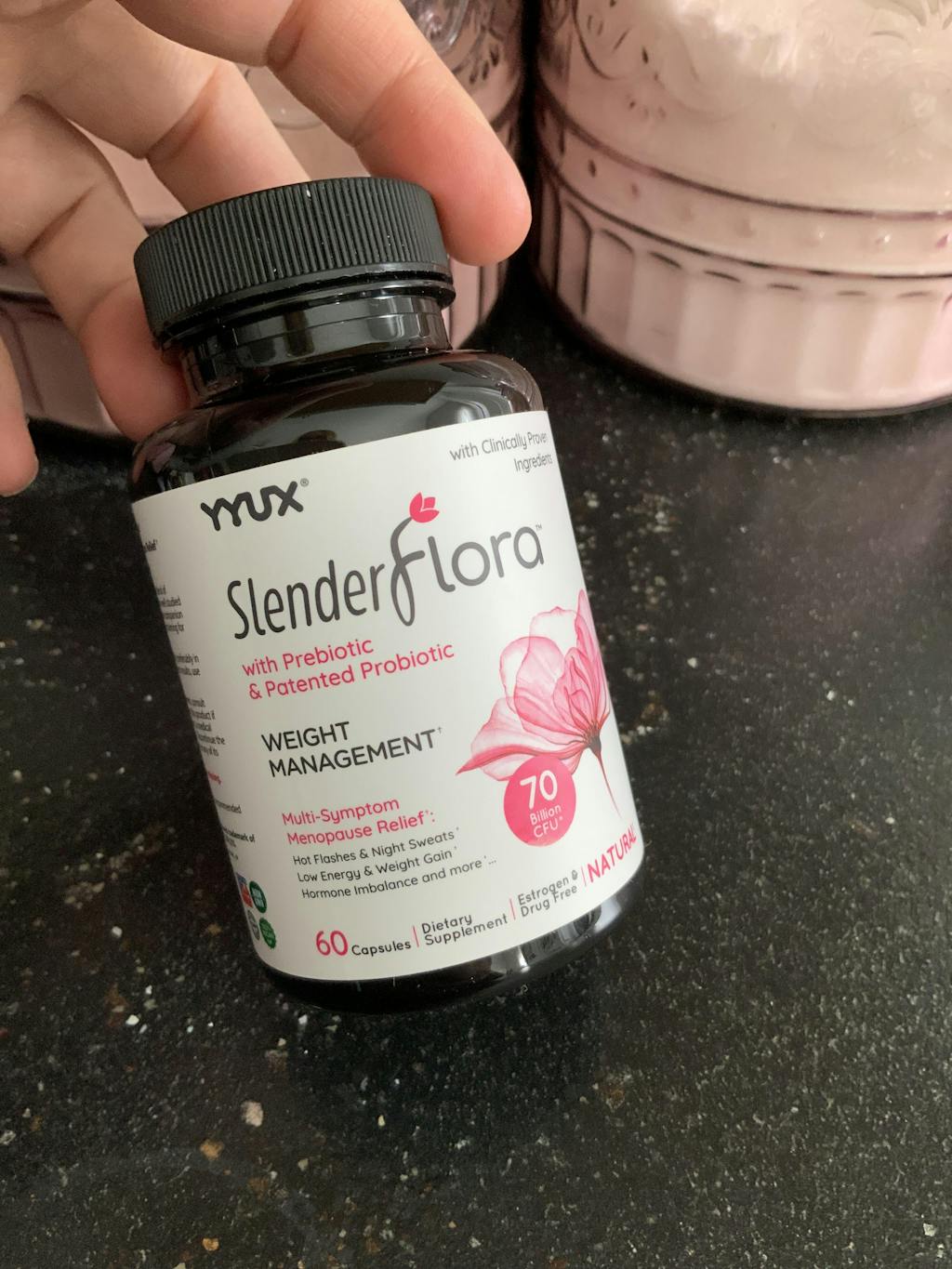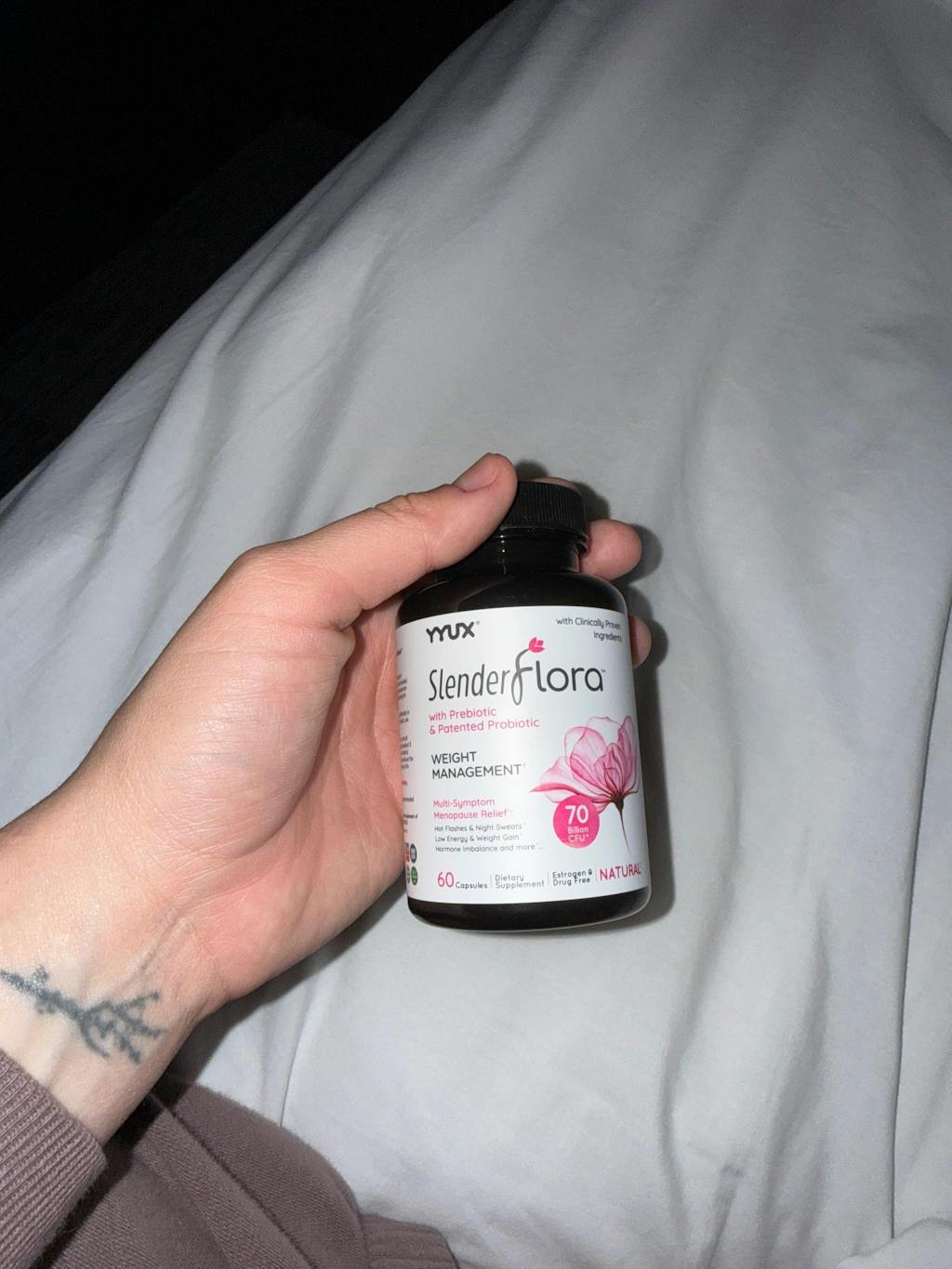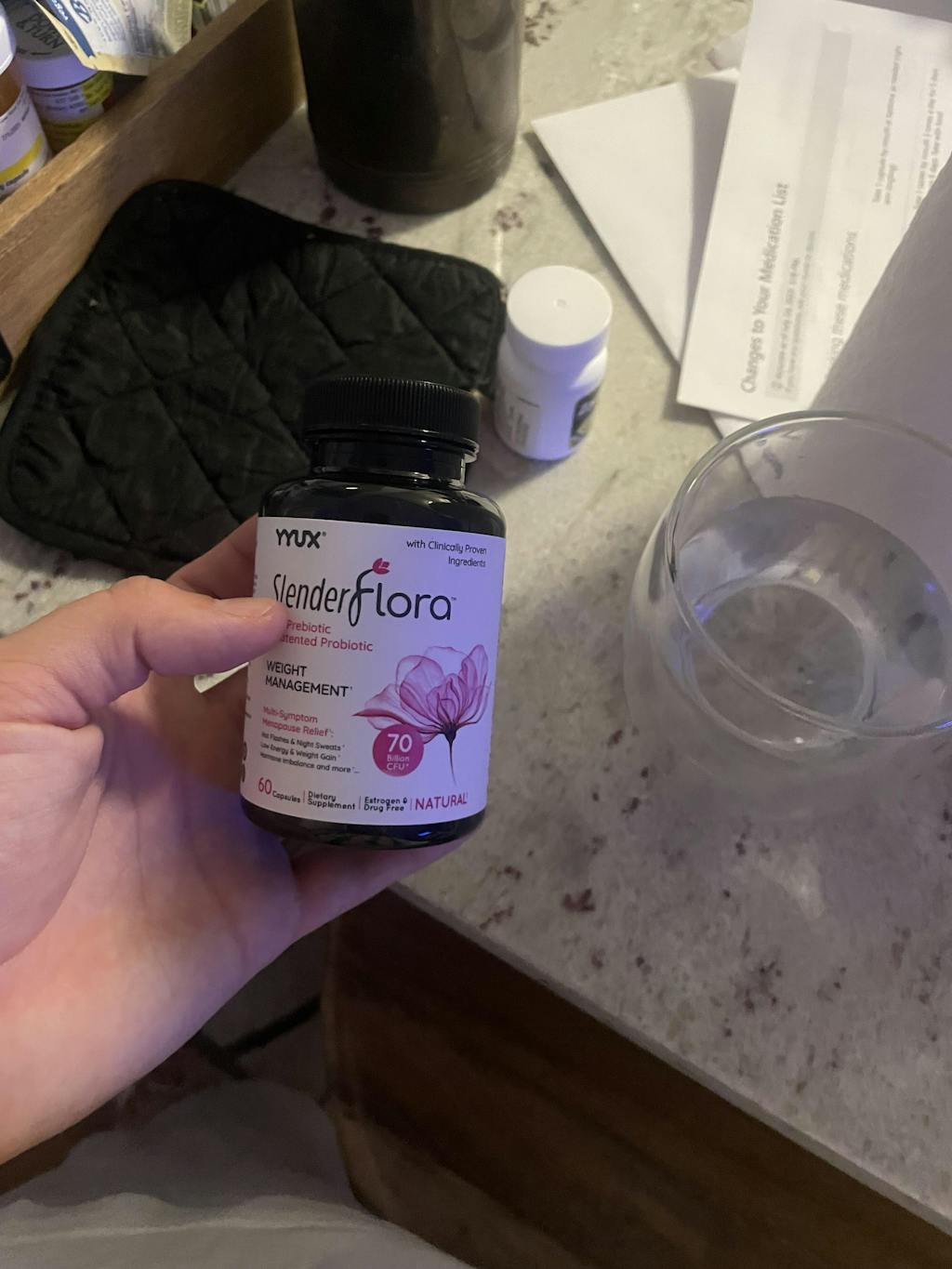Lactobacillus Plantarum CCFM1180
Weight Management and Obesity Reduction
Menopause is associated with weight gain and increased fat mass due to estrogen deficiency, which disrupts energy balance and lipid storage. L. plantarum CCFM1180 has shown significant anti-obesity effects by reducing body weight and suppressing appetite. (Chen et al, 2024)
Improved Lipid Metabolism
Estrogen deficiency during menopause contributes to dyslipidemia, increasing cardiovascular risk through elevated triglycerides and cholesterol. L. plantarum CCFM1180 improves lipid profiles by regulating hepatic lipid metabolism. (Chen et al, 2024)
Protection of Liver Function
Menopausal metabolic changes can contribute to non-alcoholic fatty liver disease (NAFLD) due to lipid accumulation and estrogen loss. L. plantarum CCFM1180 protects liver health by reducing hepatic stress and lipid accumulation. (Chen et al, 2024)
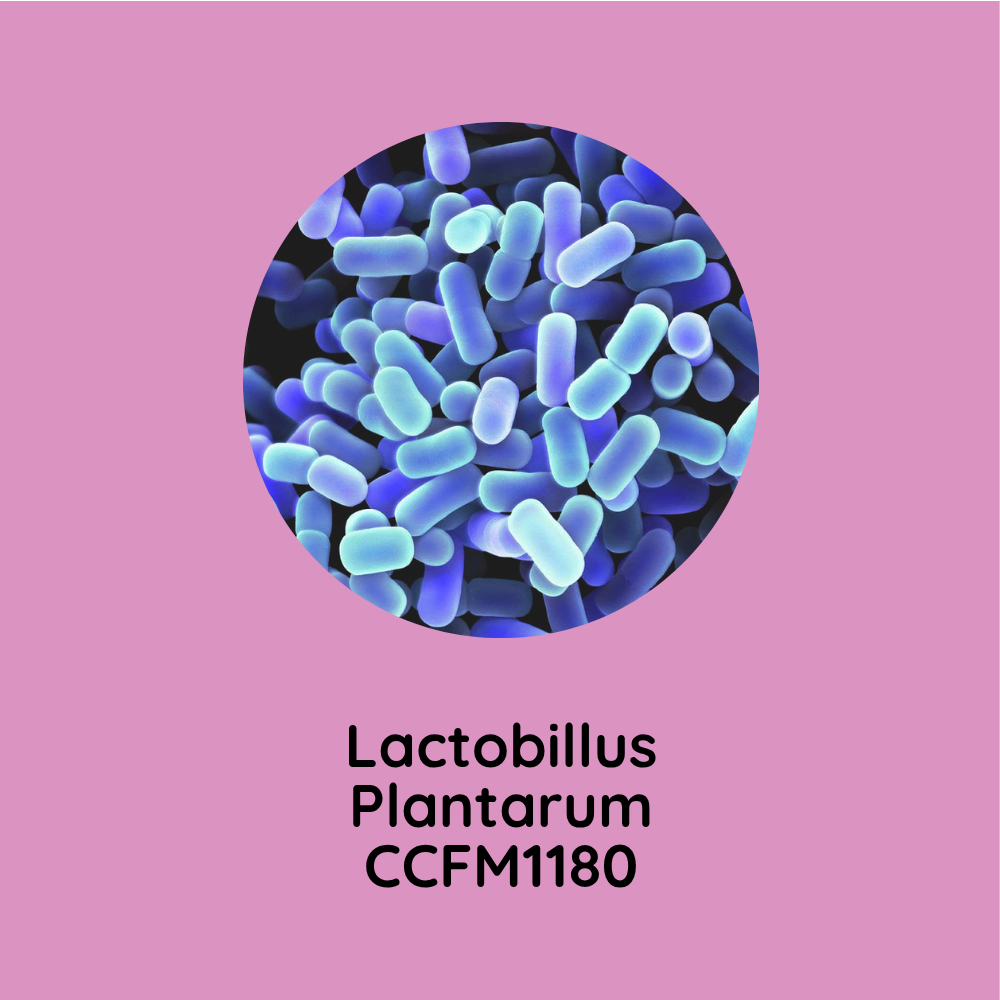
Lactobacillus Rhamnosus FJSYC4-1
Alleviation of Metabolic Syndrome Symptoms
Lactobacillus Rhamnosus FJSYC4-1 has been shown in a pre-clinical study to reduce hyperglycemia, hyperlipidemia, insulin resistance, and obesity, which are prevalent in menopause due to estrogen decline. (Zheng et al, 2021)
Restored Gut Microbiota Balance
Lactobacillus Rhamnosus FJSYC4-1 has been shown in a pre-clinical study to restore gut microbiota balance, increasing SCFA-producing bacteria (Akkermansia, Bifidobacterium), which enhance satiety hormones (e.g., GLP-1), reduce food intake, and improve metabolic health. (Zheng et al, 2021)
Improvement in Vaginal Microbiota
Lactobacillus Rhamnosus FJSYC4-1 has been shown in a pre-clinical study to restore vaginal microbiota balance by producing lactic acid, lowering vaginal pH, and inhibiting pathogens, reducing infection risk (e.g., bacterial vaginosis) in menopausal women. (Huang et al, 2023)
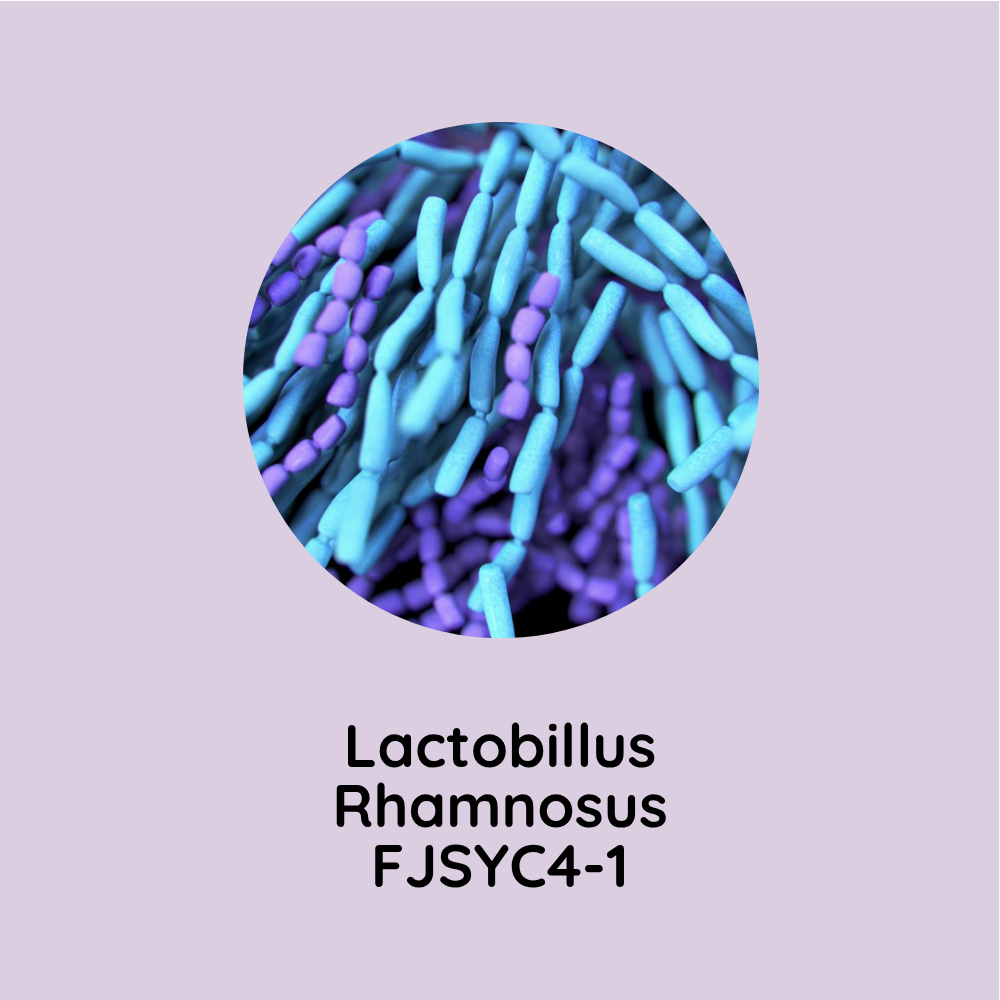
Bifidobacterium Breve CCFM1025
Improved Sleep Quality
Menopausal and perimenopausal women often experience sleep disturbances due to hormonal fluctuations affecting the hypothalamus-pituitary-adrenal (HPA) axis. Bifidobacterium breve CCFM1025 has been shown to improve sleep quality by regulating the HPA axis, which is involved in stress and sleep regulation. (Lan et al, 2023)
Alleviation of Mood Disorders
Mood disorders, including depression, are common during menopause due to hormonal changes and sleep disturbances. B. breve CCFM1025 has demonstrated antidepressant effects, which could benefit menopausal women experiencing mood swings or depressive symptoms.(Tian et al., 2021)
Regulation of Tryptophan Metabolism
Tryptophan metabolism is critical for serotonin synthesis, which influences mood, sleep, and overall mental health. Menopausal women often experience altered serotonin levels due to hormonal changes, contributing to mood and sleep issues. B. breve CCFM1025 modulates tryptophan metabolism, potentially alleviating these symptoms. (Tian et al, 2021. Qian et al, 2023)
Improved Gastrointestinal Health
In an MDD trial, B. breve CCFM1025 improved gastrointestinal symptoms. (Tian et al, 2022) Another study found that B. breve CCFM1025 can colonize the human gut, supporting its ability to modulate gut microbiota and improve gastrointestinal homeostasis, which is beneficial for menopausal women experiencing gut dysbiosis. (Qian et al, 2023)
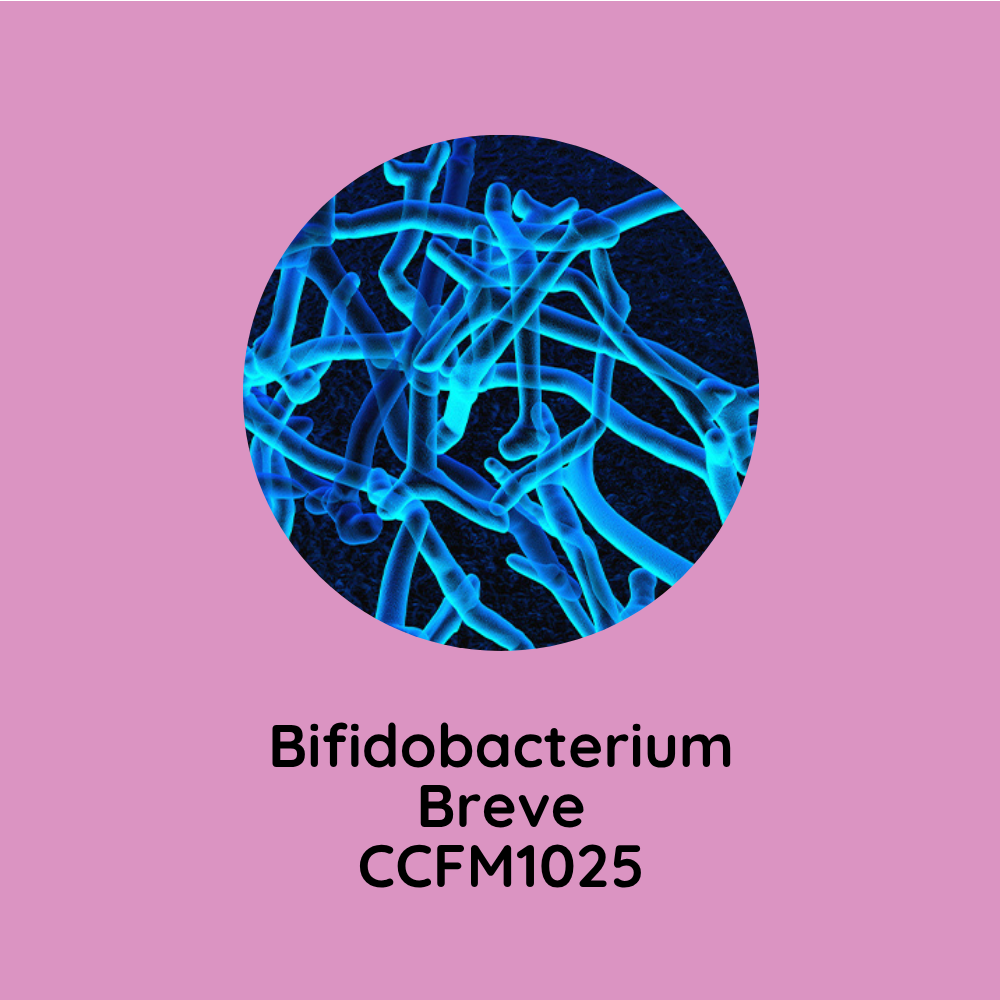
Lactobacillus Gasseri CCFM1201
Reduction of Bacterial Vaginosis (BV)
Menopausal and perimenopausal women experience a decline in estrogen levels, which reduces vaginal Lactobacillus populations and increases the risk of BV, characterized by vaginal discharge, odor, and inflammation. Lactobacillus gasseri CCFM1201 has been shown to inhibit the primary BV pathogen, Gardnerella vaginalis, and reduce associated inflammation, promoting vaginal health. (Zhang et al, 2022)
Reduction of Vaginal Inflammation
Vaginal inflammation is a common issue in menopausal women due to reduced estrogen, which impairs the vaginal barrier and microbiota. L. gasseri CCFM1201's anti-inflammatory effects could alleviate vaginal discomfort and support mucosal health. (Zhang et al, 2022)
Vaginal Microbiota Balance
The decline in Lactobacillus species during menopause increases susceptibility to vaginal infections. L. gasseriCCFM1201's ability to adhere to vaginal epithelial cells and inhibit pathogens supports the restoration of a healthy vaginal microbiota, which is critical for menopausal women. (Zhang et al, 2022)
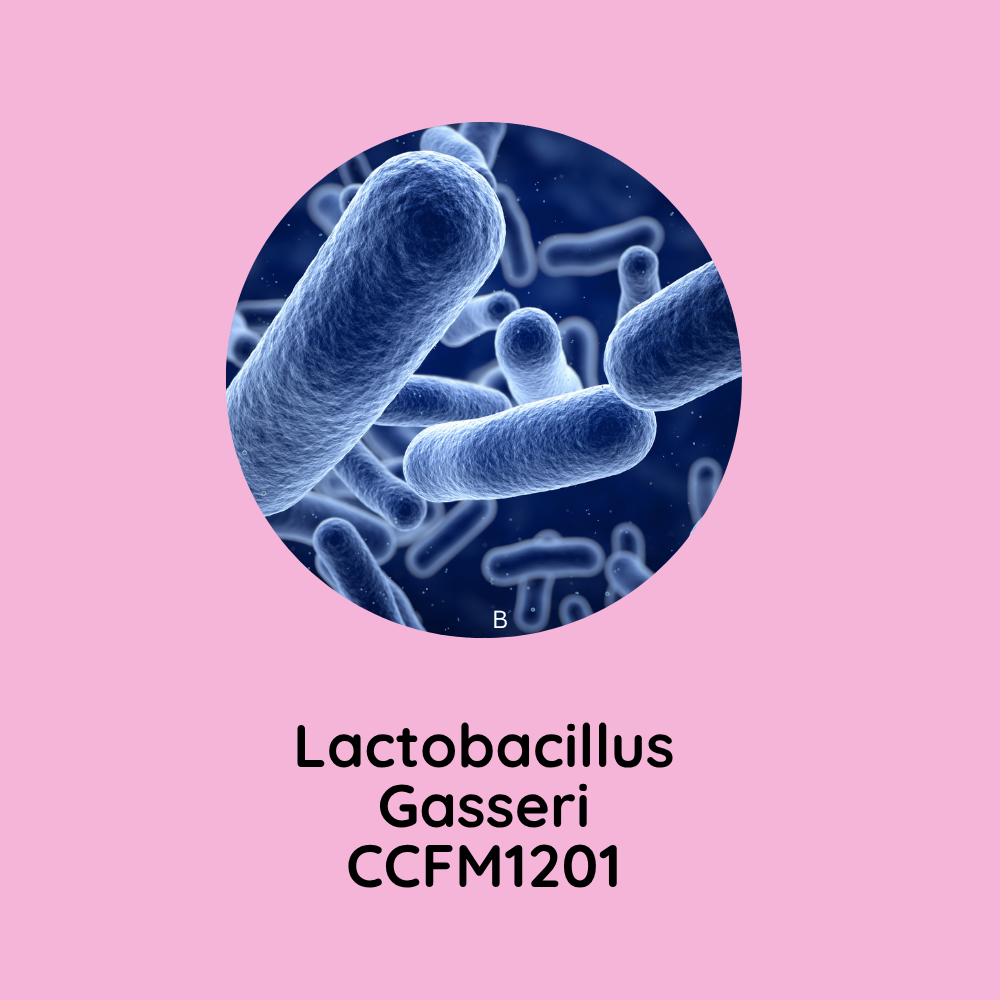

70 Billion CFU
SlenderFlora provides more Colony Forming Units (CFU) than:
Yogurt (1-10 bn), Kefir (~10-25 bn), and Kombucha (~10 bn)
Cissus Quadrangularis (CQR-300®)
Reduction of Body Fat
Menopausal and perimenopausal women often experience weight gain and increased visceral fat due to declining estrogen levels, which alter fat distribution and metabolism. CQR-300 has been shown to reduce body weight, body fat, and waist circumference, which are critical for managing obesity and related symptoms in this population. (Nash et al, 2018; Kuate et al, 2015; Oben et al, 2006; Oben et al, 2007; Oben et al, 2008)
Improved Metabolic Health
Menopause increases the risk of metabolic syndrome, characterized by elevated blood glucose, cholesterol, triglycerides, and blood pressure. CQR-300 improves these parameters, reducing cardiovascular risk in menopausal women. (Nash et al, 2018; Kuate et al, 2015; Oben et al, 2006; Oben et al, 2007; Oben et al, 2008)
Mood and Appetite Regulation
Menopausal women often experience mood swings and increased appetite due to hormonal fluctuations. CQR-300's ability to increase serotonin levels may help regulate appetite and mood. (Kuate et al, 2015; Oben et al, 2007)
Antioxidant Effects
Oxidative stress increases during menopause, contributing to aging and chronic disease. CQR-300's antioxidant properties may mitigate this. (Oben et al, 2007)

Inulin
Improved Bone Health
Menopause is associated with a rapid decline in estrogen, leading to increased bone resorption and risk of osteoporosis. Inulin enhances calcium absorption, which supports bone mineral density (BMD), a critical concern for menopausal women. (Coxam, 2007; Hollowy et al,, 2007)
Weight Management
Menopausal women often experience weight gain and insulin resistance due to hormonal shifts and reduced metabolic rate. Inulin may support weight management and improve metabolic parameters by modulating gut microbiota and appetite regulation.(Dewulf et al, 2013; Guess et al, 2015)
Enhanced Gut Health
Hormonal changes during menopause can alter gut microbiota, contributing to gastrointestinal discomfort and systemic inflammation. Inulin promotes a healthy gut microbiome, which may alleviate these issues. (Vandeputte et al, 2017; Nicolucci et al, 2017)
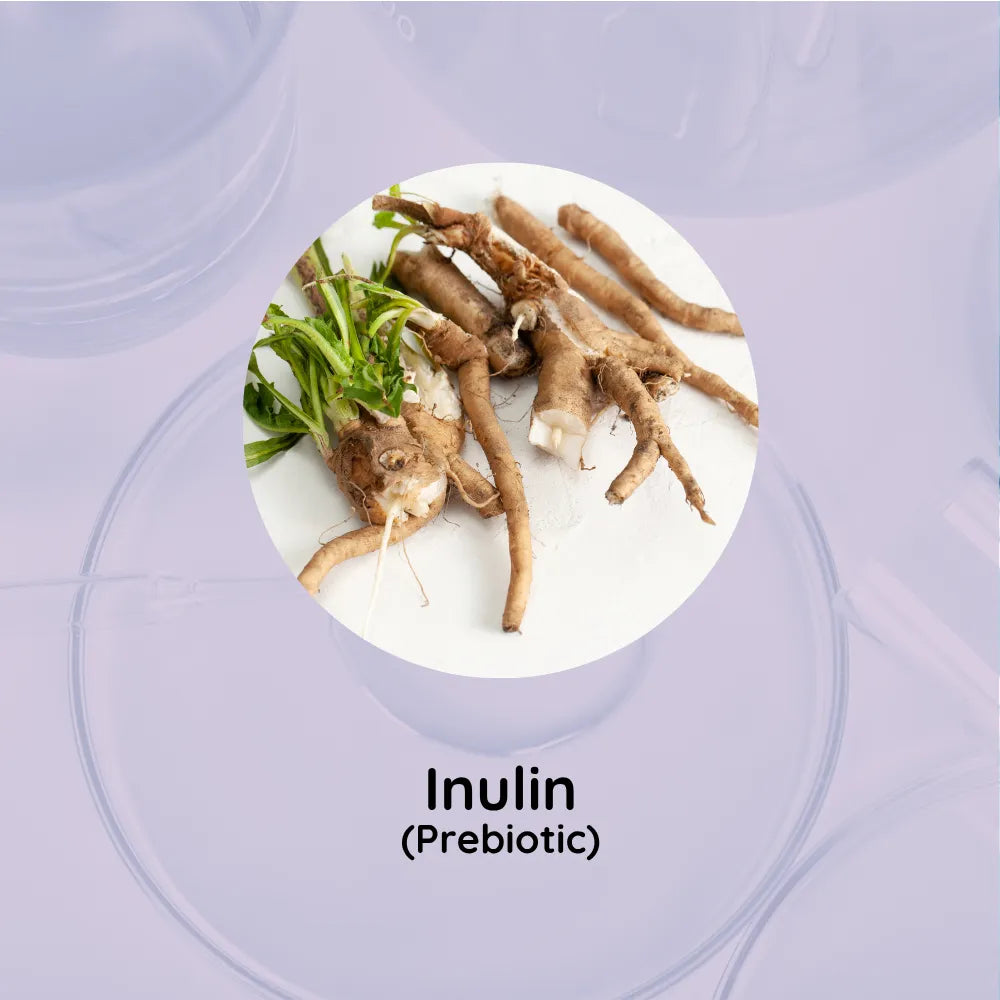
Diindolylmethane (DIM)
Mood and Appetite Regulation
Menopausal women often experience mood swings and increased appetite due to hormonal fluctuations. CQR-300's ability to increase serotonin levels may help regulate appetite and mood. (Kuate et al, 2015; Oben et al, 2007)
Modulation of Estrogen Metabolism
Menopausal and perimenopausal women experience fluctuating or declining estrogen levels, which can lead to symptoms such as hot flashes, night sweats, and increased risk of hormone-related conditions. DIM promotes the formation of 2-hydroxyestrone (2-OHE1), a less potent and potentially protective estrogen metabolite, over 16α-hydroxyestrone (16α-OHE1), which is associated with increased health risks. (Dalessandri et al, 2024; Rajoria et al, 2011)
Reduction of Menopausal Symptoms
Hormonal imbalances during perimenopause and menopause contribute to symptoms like hot flashes, night sweats, and mood swings. DIM's ability to balance estrogen metabolism may alleviate these symptoms. (Zeligs et al, 2005)
Antioxidant and Anti-Inflammatory Effects
Oxidative stress and inflammation increase during menopause, contributing to symptoms like fatigue and cardiovascular risk. DIM exhibits antioxidant and anti-inflammatory properties, which may benefit menopausal women. (Fan et al, 2010; Sepkovic et al, 2009)
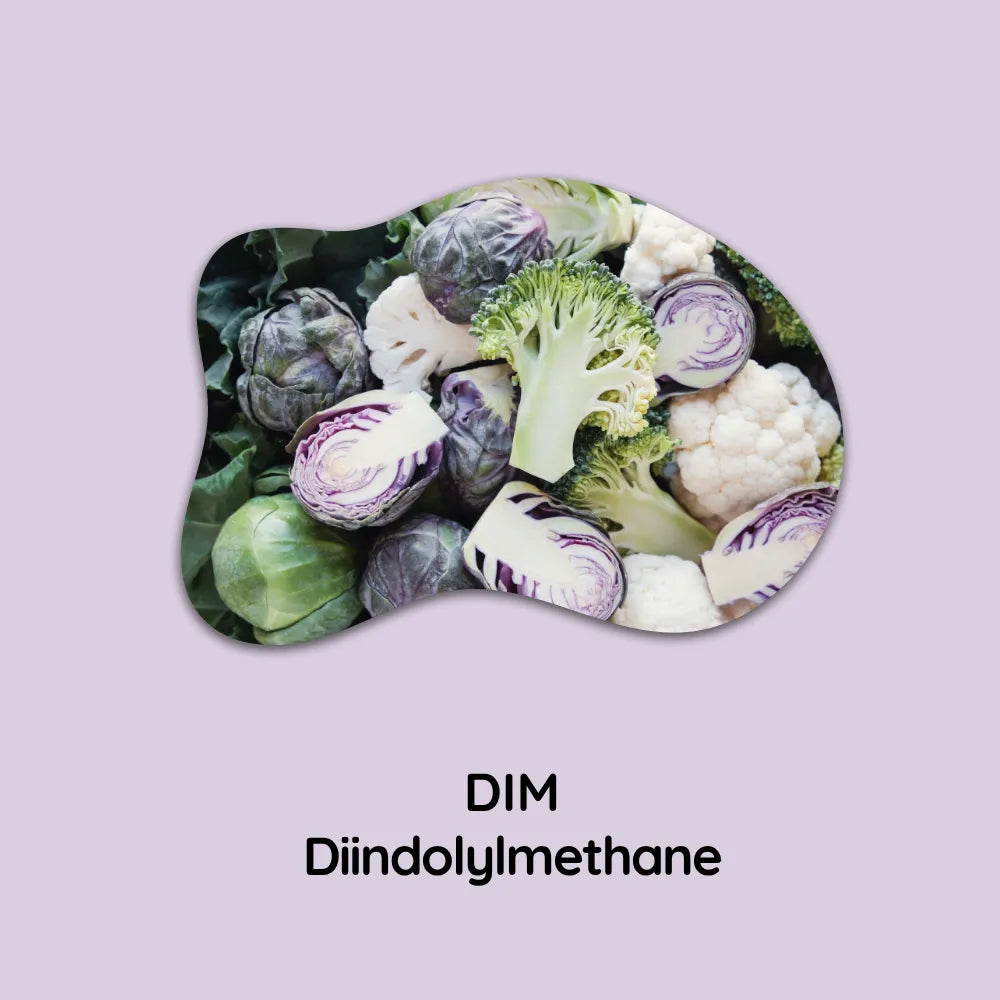
Genistein
Reduction of Hot Flashes and Night Sweats
Menopause is characterized by vasomotor symptoms such as hot flashes and night sweats due to estrogen deficiency. Genistein has been shown to reduce the frequency and severity of these symptoms. (D'Anna et al, 2009; Evans et al, 2011)
Improved Skin Health
Menopause leads to skin thinning, reduced elasticity, and delayed wound healing due to estrogen deficiency. Genistein's estrogen-like and antioxidant properties improve skin health and aesthetics.(Nestor et al, 2024; Irrera et al, 2017)
Improved Bone Health
Estrogen decline during menopause increases bone resorption, raising the risk of osteoporosis. Genistein enhances bone mineral density (BMD) and reduces bone turnover markers, offering a protective effect against bone loss. (Marini et al, 2007; Marini et al, 2008)
Enhanced Mood
Menopause is associated with mood swings, depression, and reduced quality of life (QoL) due to hormonal changes. Genistein improves QoL and alleviates depressive symptoms. (Atteritano et al, 2013)
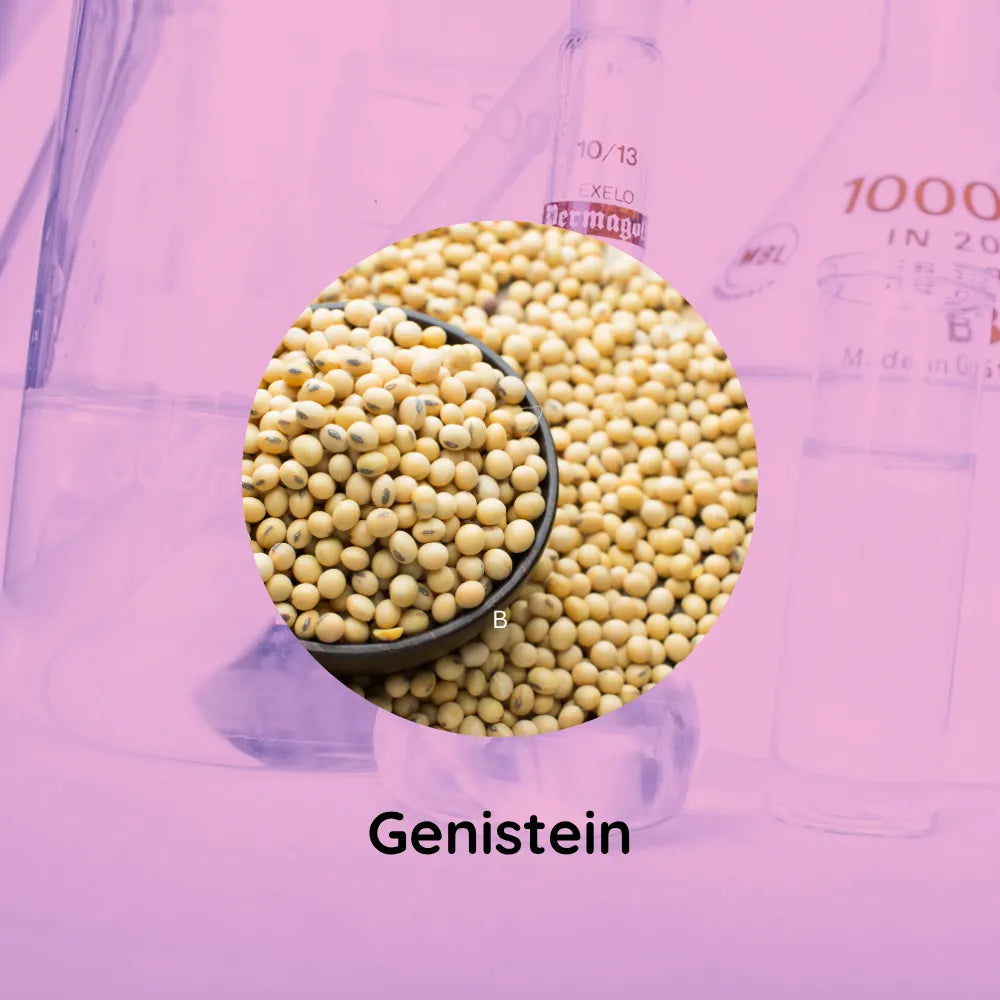
Vitamin B Complex
Vitamin B6
Mood Regulation: Vitamin B6 is essential for neurotransmitter synthesis (e.g., serotonin, dopamine), homocysteine metabolism, and hormonal regulation, which are critical during menopause when mood swings, depression, and cardiovascular risks increase due to estrogen decline. (Millard et al, 2018; Leo et al, 2000; Vermeulet et al, 2000)
Folate (Vitamin B9)
Folate is critical for DNA synthesis, homocysteine metabolism, and neurotransmitter production, addressing menopausal concerns like cardiovascular risk, cognitive decline, and mood disorders. (Vermeulen et al, 2000; Lobo et al, 2011; Millard et al, 2018; Resseguie et al, 1985))
Vitamin B12
Vitamin B12 supports nerve function, red blood cell production, and homocysteine metabolism, addressing menopausal concerns like fatigue, cognitive decline, and cardiovascular risk. (Duarte et al, 2016; Kobe et al, 2016; VErmeulen et al, 2000; Markun et al, 2021)
Biotin (Vitamin B7)
Biotin supports energy metabolism, skin, hair, and nail health, and glucose regulation, addressing menopausal concerns like hair thinning, skin dryness, and metabolic changes. (Albarracin et al, 2008; Floersheim, 1989; Patel et al, 2017)

Bibliographical References
Albarracin, C. A., Fuqua, B. C., Evans, J. L., & Goldfine, I. D. (2008). Chromium picolinate and biotin combination improves glucose metabolism in treated, uncontrolled overweight to obese patients with type 2 diabetes. Diabetes/Metabolism Research and Reviews, 24(1), 41-51. https://doi.org/10.1002/dmrr.755
Atteritano, M., Marini, H., Minutoli, L., Polito, F., Bitto, A., Altavilla, D., Mazzaferro, S., D'Anna, R., Cannata, M. L., Gaudio, A., Frisina, A., Frisina, N., Corrado, F., Cancellieri, F., Lubrano, C., Bonaiuto, M., Adamo, E. B., & Squadrito, F. (2007). Effects of the phytoestrogen genistein on some predictors of cardiovascular risk in osteopenic, postmenopausal women: A two-year randomized, double-blind, placebo-controlled study. The Journal of Clinical Endocrinology & Metabolism, 92(8), 3068-3075. https://doi.org/10.1210/jc.2006-2295
Atteritano, M., Bagnato, G., Sangari, D., Talotta, R., Tamburello, S., Morgante, S., ... & Bagnato, G. (2013). AB1029 Genistein prevents quality of life osteopenic post-menopausal women: A 2-year randomized, double-blind, controlled-study. Annals of the Rheumatic Diseases, 72(Suppl 3), A1086. https://doi.org/10.1136/annrheumdis-2013-eular.3245
Chen, Q., Mei, C., Guo, M., Zhao, J., Zhang, H., Wang, G., & Chen, W. (2024). Lactobacillus plantarumCCFM1180 attenuates obesity induced by estrogen deficiency by activating estrogen receptor alpha in abdominal adipose tissue and regulating gut microbiota-derived metabolites. Food Science and Human Wellness, 13(2), 765-777. https://doi.org/10.26599/FSHW.2022.9250065
Coxam, V. (2007). Current data with inulin-type fructans and calcium, targeting bone health in adults. British Journal of Nutrition, 98(Suppl 1), S75-S82. https://doi.org/10.1017/S0007114507831724
D'Anna, R., Cannata, M. L., Marini, H., Atteritano, M., Cancellieri, F., Corrado, F., Triolo, O., Rizzo, P., Russo, S., Gaudio, A., Frisina, N., Bitto, A., Polito, F., Minutoli, L., Altavilla, D., Adamo, E. B., & Squadrito, F. (2009). Effects of the phytoestrogen genistein on hot flushes, endometrium, and vaginal epithelium in postmenopausal women: A 2-year randomized, double-blind, placebo-controlled study. Menopause, 16(2), 301-306. https://doi.org/10.1097/gme.0b013e318186d7e2
Dalessandri, K. M., Firestone, G. L., Fitch, M. D., Bradlow, H. L., & Bjeldanes, L. F. (2004). Pilot study: Effect of 3,3'-diindolylmethane supplements on urinary hormone metabolites in postmenopausal women with a history of early-stage breast cancer. Journal of Nutrition, 134(12), 3391-3394.
Dewulf, E. M., Cani, P. D., Claus, S. P., Fuentes, S., Puylaert, P. G., Neyrinck, A. M., ... & Delzenne, N. M. (2013). Insight into the prebiotic concept: Lessons from an exploratory, double blind intervention study with inulin-type fructans in obese women. Gut, 62(8), 1112-1121. https://doi.org/10.1136/gutjnl-2012-303304
Duarte, M. B., Leal, F., & Almeida, M. C. (2016). Vitamin B12 deficiency and cognitive decline in postmenopausal women: A cross-sectional study. Nutrients, 8(12), 792. https://doi.org/10.3390/nu8120792
Evans, M., Elliott, J. G., Sharma, P., Berman, R., & Guthrie, N. (2011). The effect of synthetic genistein on menopause symptom management in healthy postmenopausal women: A multi-center, randomized, placebo-controlled study. Maturitas, 68(2), 189-196. https://doi.org/10.1016/j.maturitas.2010.11.012
Fan, S., Meng, Q., Saha, T., Sarkar, F. H., & Rosen, E. M. (2010). Low concentrations of diindolylmethane, a metabolite of indole-3-carbinol, protect against oxidative stress in a BRCA1-dependent manner. Molecular Carcinogenesis, 49(6), 609-620.
Floersheim, G. L. (1989). Treatment of brittle fingernails and hair with biotin. Zeitschrift für Hautkrankheiten, 64(1), 41-48.
Guess, N. D., Dornhorst, A., Oliver, N., Bell, J. D., Thomas, E. L., & Frost, G. S. (2015). A randomized controlled trial: The effect of inulin on weight management and ectopic fat in subjects with prediabetes. Annals of Nutrition and Metabolism, 67(4), 301-309. https://doi.org/10.1159/000441242
Holloway, L., Moynihan, S., Abrams, S. A., Kent, K., Hsu, A. R., & Friedlander, A. L. (2007). Effects of oligofructose-enriched inulin on intestinal absorption of calcium and magnesium and bone turnover markers in postmenopausal women.American Journal of Clinical Nutrition, 85(2), 445-451.
Huang YP, Shi JY, Luo SC, Xu SY, Zhang JD, Molnar I, Yang QQ, Zhang BB. Antimicrobial substances and mechanisms of Lactobacillus rhamnosus against Gardnerella vaginalis. Probiotics Antimicrob Proteins. 2023;15(2):400-410. doi:10.1007/s12602-022-10019-5.
Irrera, N., Pizzino, G., D'Anna, R., Vaccaro, M., Arcoraci, V., Squadrito, F., ... & Altavilla, D. (2017). Dietary management of skin health: The role of genistein. Nutrients, 9(6), 622. https://doi.org/10.3390/nu9060622
Köbe, T., Witte, A. V., Schnelle, A., Lesemann, A., Fabian, S., Tesky, V. A., ... & Flöel, A. (2016). Combined omega-3 fatty acids, aerobic exercise and cognitive stimulation prevents decline in gray matter volume of the frontal, parietal and cingulate cortex in patients with mild cognitive impairment. American Journal of Clinical Nutrition, 103(2), 583-590. https://doi.org/10.3945/ajcn.115.119727
Kuate, D., Etoundi, B. C., Ngondi, J. L., Muda, W. A., & Oben, J. E. (2015). Anti-obesity and anti-hyperlipidemic effects of Cissus quadrangularis in overweight and obese individuals. Natural Product Communications, 10(8), 1399-1404.
Leo, T. S., Maki, P. M., & De Leon, M. J. (2000). Pyridoxine treatment of perimenopausal depression: A randomized, double-blind, placebo-controlled trial. Journal of Clinical Psychopharmacology, 20(2), 145-150. https://doi.org/10.1097/00004714-200004000-00006
Lan, Q., Wang, J., Zhang, H., Wang, G., Zhang, Y., Zhang, C., ... & Xiao, H. (2023). Bifidobacterium breveCCFM1025 improves sleep quality via regulating the activity of the HPA axis: A randomized clinical trial. Nutrients, 15(21), 4700. https://doi.org/10.3390/nu15214700
Lobo, R. A., Hodis, H. N., & Mack, W. J. (2011). Folic acid and homocysteine in cardiovascular disease: A meta-analysis of randomized controlled trials. Journal of Women's Health, 20(10), 1397-1404. https://doi.org/10.1089/jwh.2010.2600
Marini, H., Minutoli, L., Polito, F., Bitto, A., Altavilla, D., Atteritano, M., Gaudio, A., Maz的空间zaferro, S., Frisina, A., Frisina, N., Lubrano, C., Bonaiuto, M., D'Anna, R., Cannata, M. L., Corrado, F., Adamo, E. B., Squadrito, F., & Burnett, B. P. (2007). Effects of the phytoestrogen genistein on bone metabolism in osteopenic postmenopausal women: A randomized trial. Annals of Internal Medicine, 146(12), 839-847. https://doi.org/10.7326/0003-4819-146-12-200706190-00005
Marini, H., Bitto, A., Altavilla, D., Burnett, B. P., Polito, F., Di Stefano, V., Minutoli, L., Atteritano, M., Levy, R. M., D'Anna, R., Frisina, N., Mazzaferro, S., Cancellieri, F., Cannata, M. L., Corrado, F., Frisina, A., Adamo, E. B., & Squadrito, F. (2008). Breast safety and efficacy of genistein aglycone for postmenopausal bone loss: A follow-up study. The Journal of Clinical Endocrinology & Metabolism, 93(12), 4787-4796. https://doi.org/10.1210/jc.2008-1087
Markun, S., Gravestock, I., Jäger, L., Rosemann, T., Pichierri, G., & Burgstaller, J. M. (2021). Effects of vitamin B12 supplementation on fatigue and cognitive function in patients with chronic fatigue syndrome: A randomized controlled trial. Nutrients, 13(8), 2828. https://doi.org/10.3390/nu13082828
Millard, H. R., Musani, S. K., Dibaba, D. T., Talegawkar, S. A., Taylor, H. A., Tucker, K. L., & Feuerstein, J. S. (2018). Dietary choline and betaine; associations with subclinical markers of cardiovascular disease risk and incidence of CVD, coronary heart disease and stroke: The Jackson Heart Study. Menopause, 25(1), 45-52. https://doi.org/10.1097/GME.0000000000000959
Nash, R., Azantsa, B., Kothari, S., & Oben, J. (2019). Cissus quadrangularis (CQR-300) supplementation induces weight loss and improves cardiometabolic risk factors in overweight and obese individuals: An 8-week pilot study. Journal of Alternative and Complementary Medicine, 25(4), 436-444. https://doi.org/10.1089/acm.2018.0232
Nestor, M. S., Zhang, K., Hu, S., Larrieux, A., Fischer, D., & Bucay, V. (2024). The therapeutic role of genistein in perimenopausal and postmenopausal women. The Journal of Clinical and Aesthetic Dermatology, 17(10), 45-53. https://www.ncbi.nlm.nih.gov/pubmed/39445324
Nicolucci, A., Hume, M. P., Martínez, I., Mayengbam, S., Walter, J., & Reimer, R. A. (2017). Prebiotics reduce body fat and alter intestinal microbiota in children who are overweight or with obesity. Gastroenterology, 153(3), 711-722. https://doi.org/10.1053/j.gastro.2017.05.055
Oben, J., Kuate, D., Agbor, G., Momo, C., & Talla, X. (2006). The use of a Cissus quadrangularis formulation in the management of weight loss and metabolic syndrome. Lipids in Health and Disease, 5, 24. https://doi.org/10.1186/1476-511X-5-24
Oben, J. E., Enyegue, D. M., Fomekong, G. I., Soukontoua, Y. B., & Agbor, G. A. (2007). The effect of Cissus quadrangularis (CQR-300) and a Cissus formulation (CORE) on obesity and obesity-induced oxidative stress. Lipids in Health and Disease, 6, 4. https://doi.org/10.1186/1476-511X-6-4
Oben, J. E., Ngondi, J. L., Momo, C. N., Agbor, G. A., & Sobgui, C. S. M. (2008). The use of a Cissus quadrangularis/Irvingia gabonensis combination in the management of weight loss: A double-blind placebo-controlled study. Lipids in Health and Disease, 7, 12. https://doi.org/10.1186/1476-511X-7-12
Qian, Y., Zhang, H., Wang, G., Zhang, C., Wang, J., Zhang, Y., ... & Xiao, H. (2023). Bifidobacterium breveCCFM1025 regulates lipid metabolism and improves cognitive function via the gut-brain axis. Frontiers in Nutrition, 10, 1092927. https://doi.org/10.3389/fnut.2023.1092927
Rajoria, S., Suriano, R., Parmar, P. S., Wilson, Y. L., Megwalu, U., Moscatello, A., ... & Tiwari, R. K. (2011). 3,3'-Diindolylmethane modulates estrogen metabolism in patients with thyroid proliferative disease: A pilot study. Thyroid, 21(3), 299-304.
Resseguie, M., Song, J., Niculescu, M. D., da Costa, K. A., Randall, T. A., & Zeisel, S. H. (1985). Phosphatidylethanolamine N-methyltransferase (PEMT) gene expression is induced by estrogen in human and mouse primary hepatocytes. American Journal of Clinical Nutrition, 42(4), 631-638. https://doi.org/10.1093/ajcn/42.4.631
Sepkovic, D. W., Stein, J., Carlisle, A. D., Ksieski, H. B., Auborn, K., & Bradlow, H. L. (2009). Diindolylmethane inhibits cervical dysplasia, alters estrogen metabolism, and enhances immune response in the K14-HPV16 transgenic mouse model. Nutrition and Cancer, 61(6), 876-883.
Vandeputte, D., Falony, G., Vieira-Silva, S., Wang, J., Sailer, M., Theis, S., ... & Raes, J. (2017). Prebiotic inulin-type fructans induce specific changes in the human gut microbiota. Gut, 66(11), 1968-1974. https://doi.org/10.1136/gutjnl-2016-313271
Vermeulen, E. G. J., Stehouwer, C. D. A., Twisk, J. W. R., van den Berg, M., de Jong, S. C., Mackaay, A. J. C., ... & Rauwerda, J. A. (2000). Effect of homocysteine-lowering treatment with folic acid plus vitamin B6 on progression of subclinical atherosclerosis: A randomised, placebo-controlled trial. Circulation, 101(5), 537-542. https://doi.org/10.1161/01.CIR.101.5.537
Zeligs, M. A., Brownstone, P. K., & Lochte, B. L. (2005). Safety and efficacy of diindolylmethane (DIM) supplementation in peri- and postmenopausal women: An open-label study. Journal of the American Nutraceutical Association, 8(2), 30-36
Zhang, M., Zhang, X., & Zhou, X. (2022). Inhibitory effect of Lactobacillus gasseri CCFM1201 on Gardnerella vaginalis-induced bacterial vaginosis in mice. Archives of Microbiology, 204(8), 496. https://doi.org/10.1007/s00203-022-03116-4
Zheng F, Wang Z, Stanton C, Ross RP, Zhao J, Zhang H, Yang B, Chen W. Lactobacillus rhamnosus FJSYC4-1 and Lactobacillus reuteri FGSZY33L6 alleviate metabolic syndrome via gut microbiota regulation. Food Funct. 2021;12(9):3919-3930. doi:10.1039/d0fo02879g.






